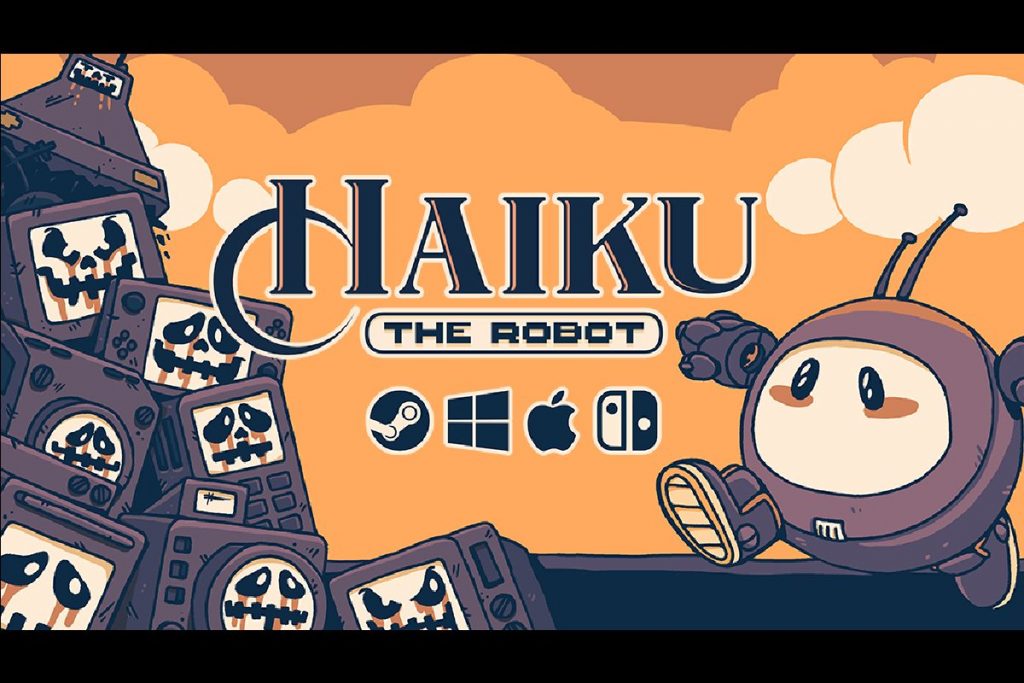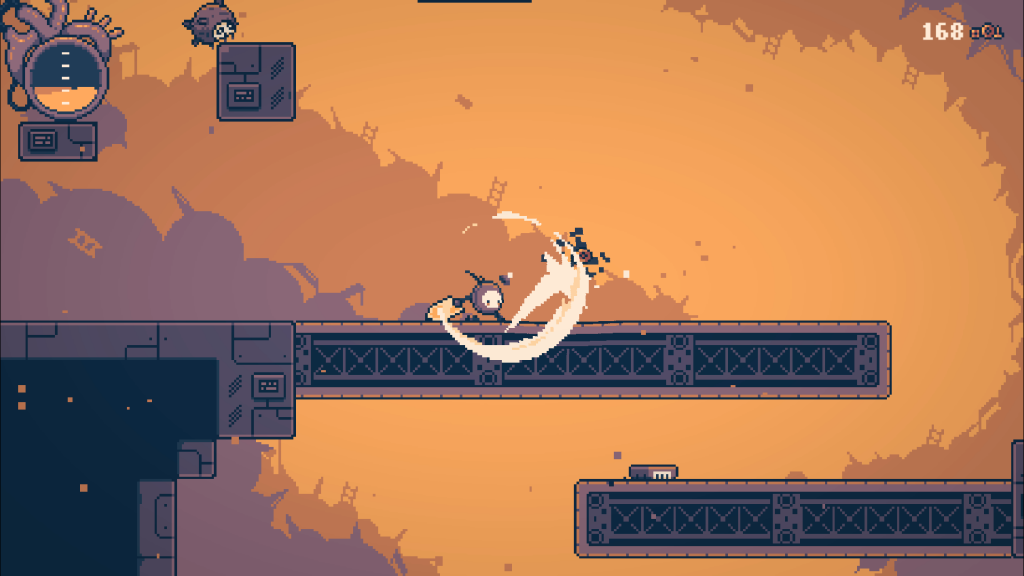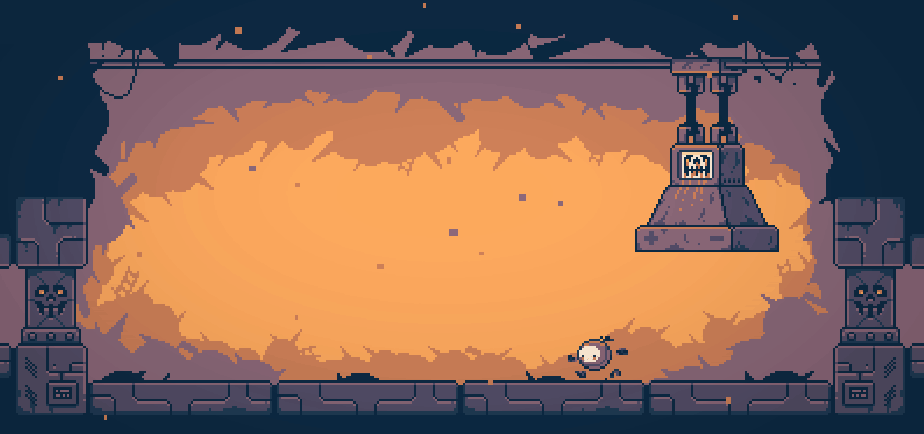If we have learned anything from ‘’The Matrix’’ and ‘’The Terminator’’, it’s that machines are often portrayed as sentient beings in a post-apocalyptic age, with only one objective in mind: destroying humanity. But what happens after humanity has completely been wiped and a virus starts spreading, putting in danger the new inhabitants of earth?
Haiku, The Robot happens.
Set in a post-apocalyptic world created by solo game developer Mister Morris Games‘s Jordan Morris, ‘Haiku, The Robot’ is a 2D action-adventure metroidvania, inspired by classics such as Super Metroid, and is filled with stunning art, action-packed visual effects, and an impressive soundtrack made by composer Guy Jones. In this story, four artificial intelligence beings evolved and worked together to develop a realm of peace and stability where robots thrived. Soon after, however, Haiku, a cute bomb-looking robot, discovers that an evil virus has spread and threatens the programs that run the machines in its world. Without those programs, the machines are now malfunctioning, and Haiku’s world is breaking down. Our hero, equipped with a mysterious microchip that wasn’t infected by the virus, then sets out on a journey to save the world from the Evil Virus.
Haiku, the Robot is being funded via Kickstarter and launched September 7, 2020, with a £22,000 funding goal (approx. €24,500 or $29,000 USD) over the course of 32 days. As part of the Kickstarter launch, people interested can download a demo of the game to get a feel to what Haiku, the Robot promises to deliver when it releases. I was also pleasantly surprised to learn that Morris taught himself everything there is to know when it comes to creating a game, from art to coding, as he worked his 9 to 5 job. His Kickstarter will help him quit his daytime bread-earning work to be able to focus on Haiku, the Robot. I was lucky enough to be able to get my hands on the demo before the Kickstarter launched and share my non-biased opinion with all post-apocalyptic game enthusiasts out there.
Loaded with cute-but-deadly characters that are designed around everyday items, the demo includes enemies such as a washing machine, a Nokia phone (we all know those are indestructible, even after humanity’s downfall), light bulbs, old tires, and so on. As Haiku runs around the different sections of the map, new powers are unlocked such as the double jump, dash, the ability to roll to reach certain areas, and the ability to ‘bomb’ enemies through a small explosion. Players will also gather a currency called ‘Spare Parts’, which will allow them to buy upgrades for their abilities. This mechanic is not yet available in the demo.
 What I found absolutely stunning in this short 40-minute-or-so-demo, is the attention to details in the animations that Morris implemented. Pixel-like debris is shot from certain impacts, and circular sonic waves appear through some attacks, giving more depth to the action the player is doing, leaving one truly immersed within the game. After a few deaths and healing station stops, I was able to reach the first and only boss in the demo: a garbage magnet described by Morris as ‘tormented by his own past and by what the virus has brought upon his family.’ During this first boss fight, I was left jaw agape, simply because of the combination of the design of the stage, the visual effects, and goosebumps-inducing boss fight music. I would even be bold enough to compare the feeling to encountering a ‘Dark Souls’ boss for the first time: intense. It was a wonderful experience, so much so that I had to play it a second time. And then a third time, just for the fun of it.
What I found absolutely stunning in this short 40-minute-or-so-demo, is the attention to details in the animations that Morris implemented. Pixel-like debris is shot from certain impacts, and circular sonic waves appear through some attacks, giving more depth to the action the player is doing, leaving one truly immersed within the game. After a few deaths and healing station stops, I was able to reach the first and only boss in the demo: a garbage magnet described by Morris as ‘tormented by his own past and by what the virus has brought upon his family.’ During this first boss fight, I was left jaw agape, simply because of the combination of the design of the stage, the visual effects, and goosebumps-inducing boss fight music. I would even be bold enough to compare the feeling to encountering a ‘Dark Souls’ boss for the first time: intense. It was a wonderful experience, so much so that I had to play it a second time. And then a third time, just for the fun of it.
Throughout the multiple playthroughs, and admittedly by accident, I was able to find ways to sequence-skip for potential speed runs of the game. I had to double check with the solo-dev and asked him if it was a bug, but Morris confirmed that he wanted players to be able to eventually speed run the game, which in my opinion is another great endeavor to tackle when creating a game. All in all, I had a wonderful experience playing the game and am excited to see what other new adventures Haiku will bring me when the game releases.
You can get more information about Haiku, the Robot through its Kickstarter. Pledges hold many tiers with different rewards, including Haiku, the Robot t-shirts, socks, mugs, digital art book and soundtrack, enemy, character and boss designers, and more.
Haiku, the Robot is set to release in October 2021 on PC, and Nintendo Switch should the stretch goal be met. The game can also be put on your wishlist through Steam. Join the behind-the-scenes news on Instagram, Twitter, Facebook, or Discord.
Want to stay updated on all things post-apocalyptic? Join our email list here.



